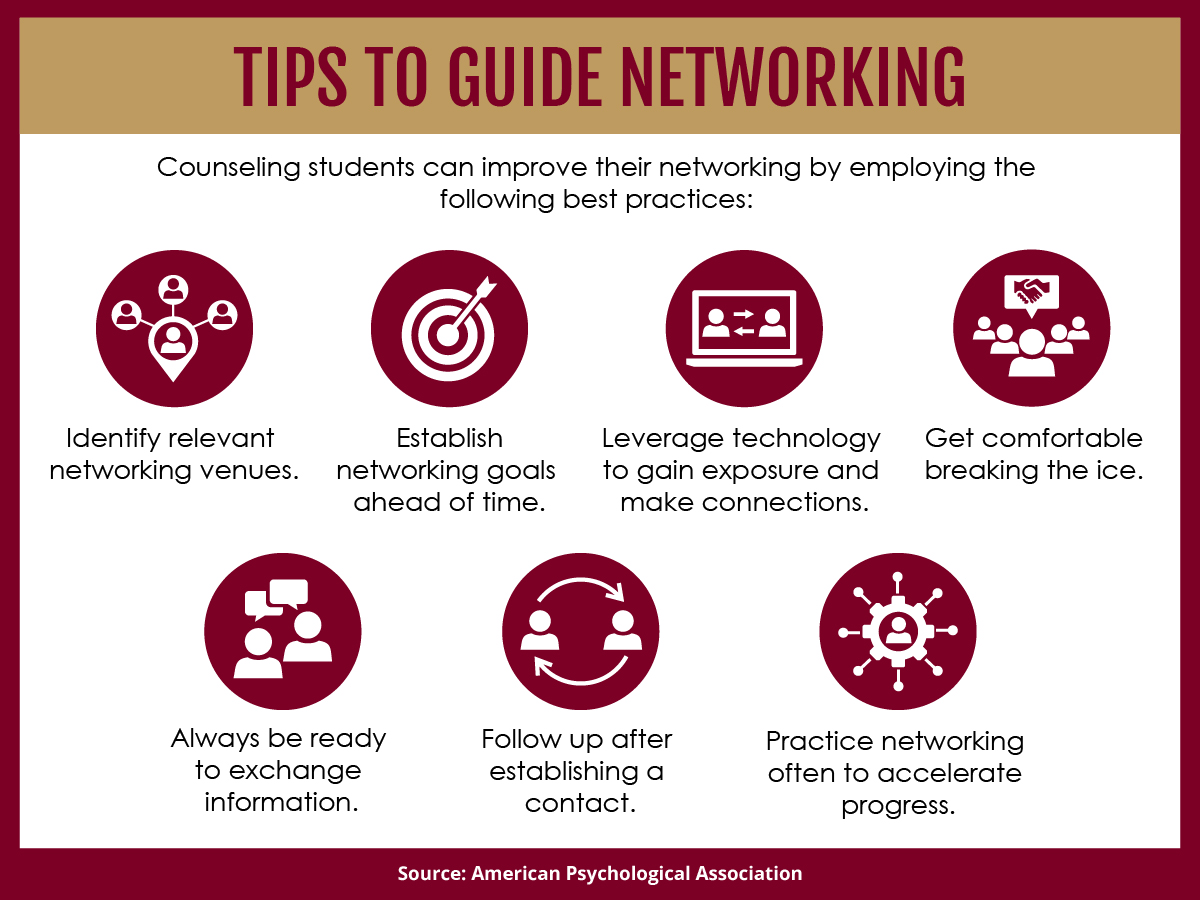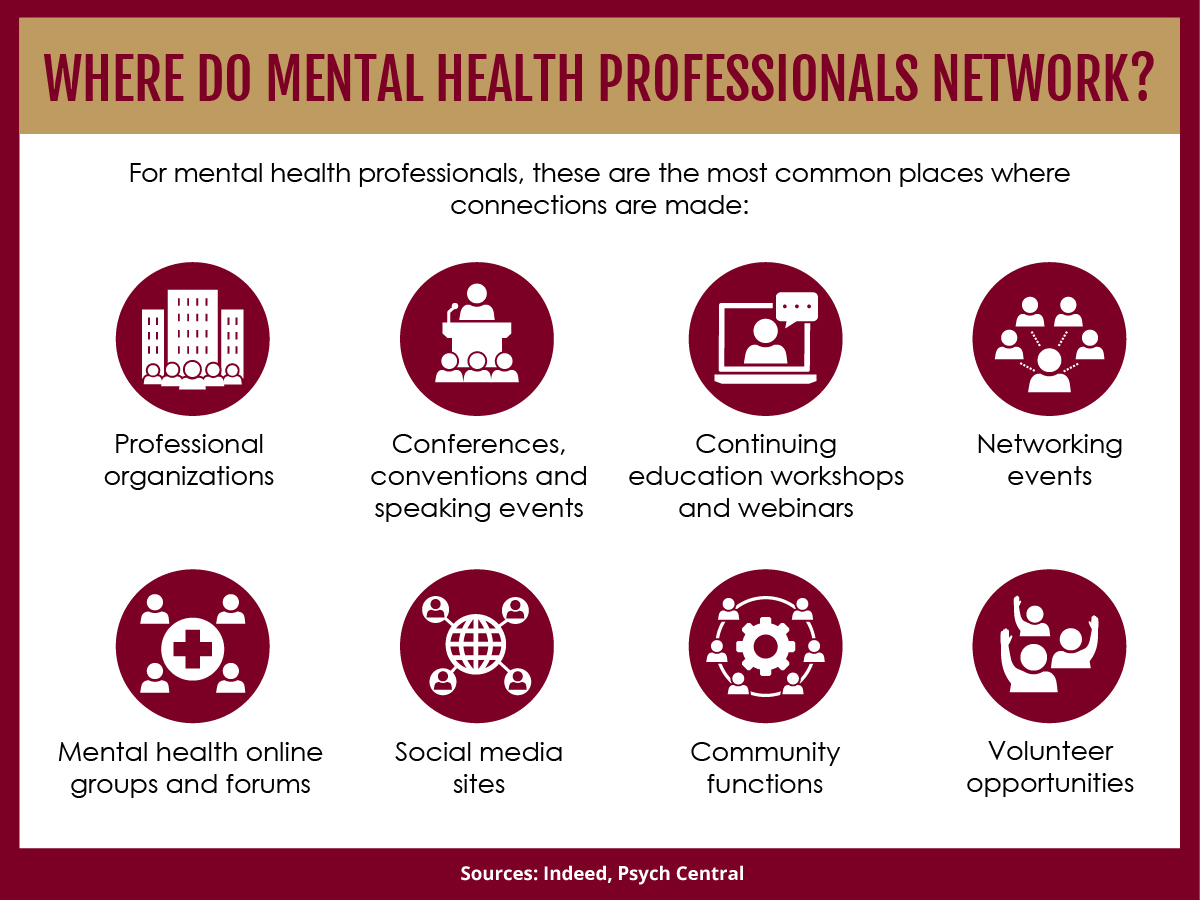How to Build and Strengthen Your Counseling Network

July 18, 2024
Effective mental health counselors are excellent communicators, empathetic, trustworthy, and genuinely concerned about their patients’ well-being. These qualities hold universal value among practitioners, regardless of their area of focus. However, to succeed in the mental health field, counselors and counselors must hone an essential skill responsible for their long-term career growth, industry knowledge and resource development: networking.
As all mental health providers discover, earning a degree and a license to practice doesn’t come with a client list. New counselors must work their way up from the bottom; this means networking for mental health students is essential for learning how to generate opportunities, acclimate to the industry and establish an online presence.
Building a solid professional network in the mental health field fosters collaboration and knowledge-sharing among peers; provides professional development opportunities; and helps practitioners stay up to date on the latest research, treatment methodologies and industry trends. Perhaps most important, networking can lead to patient referrals, paid speaking engagements and other opportunities that increase exposure and earnings potential.
Ultimately, by investing in meaningful connections, mental health professionals enhance their career prospects while advancing the field and the quality of patient care. Students may find Walsh University’s unique approach to education beneficial because of the personalized support offered to our online counseling student community, making for a smoother transition into a professional career.

Building Your Network as an Online Student
Networking is the process of establishing and nurturing professional relationships with individuals in the field. It involves interacting with peers, colleagues, industry leaders and other professionals through various platforms, such as conferences, workshops, social media, and relevant associations.
Effective networking requires active engagement and contribution, in which both parties benefit from the relationship. Building meaningful connections can foster personal and professional growth.
Learning to Pitch Yourself
Effective networkers can convey their unique value proposition in under a minute. When interacting with a potential connection, whether online or in person, a succinct introduction goes a long way in terms of retention.
Employ the following best practices when networking:
- Mentally outline your goals ahead of time. This can be meeting a specific person or a mental health professional who practices in a specialty area that you’re interested in learning more about.
- Develop an elevator pitch. This should include your name and a brief description of what you do, or your area of expertise. The more concise, the easier it’ll be for people to remember.
- Keep your conversations memorable but brief. If you’re at a social function or convention, don’t take up too much of a person’s time.
- Create print and digital methods of exchanging contact information. If you hit it off with a new contact, you can pass along a traditional business card or an e-business card, which can be shared using Google Wallet, Apple Wallet, QR codes or URLs.
- Stay in touch with a timely follow-up. After a day or two, follow up with your new contact to let them know you enjoyed meeting them. Mention a specific detail from your conversation that you found particularly insightful. This shows that you were paying attention and that you found the interaction meaningful. Conclude with an open invitation to meet for coffee to continue the conversation.
- Nurture your contacts. You can interact with professionals online in many ways that show you’re interested in what they have to say without coming off as overly eager. Liking and sharing high-value social media posts can go a long way. You should also feel free to share things with your contacts that are relevant to their area of practice that’ll pique their professional interest. It can be as simple as sending them a mental health counseling versus social work article you found insightful.
Networking for Mental Health Professionals: Best Practices
Counseling students and new counselors often encounter similar challenges when building their brands and making their initial online introductions to potential networking contacts. First, standing out in a saturated market is no small task. Many established professionals already have a strong online presence, so new entrants must find unique ways to differentiate themselves and highlight their skills, specialties, and therapeutic approaches.
Building trust and credibility without a substantial track record or client testimonials is another challenge. Engaging with the community, making valuable contributions, and consistently participating in professional discussions can help a person establish themselves, but it requires time and sustained effort. Meaningful connections don’t happen overnight.
Counseling students can foster the growth of their professional networks and maximize their exposure by employing a multifaceted strategy. The sections below highlight virtual mental health networking tactics that help create an online presence and help establish connections.
Join Online Communities and Professional Organizations
The internet has revolutionized the networking process for aspiring counselors. By using the right resources and connecting online, counseling students can build their professional contact lists and develop key relationships that’ll benefit them long term.
Joining online communities for mental health professionals is an excellent way to become acquainted with other practitioners and engage with different topics. Some forums discuss the mental health field in a broad sense while others are more specific, such as working with underserved communities as a clinical social worker. Online communities enable mental health professionals to exchange ideas, highlight successful therapy tactics, ask questions and learn from each other’s mistakes, all of which are valuable to new mental health counselors who are still acclimating to their role.
The challenge of the online counseling student community is finding a group that suits your needs, delivers value and is open to new members. Due to the sensitive nature of counseling and privacy concerns, online communities for mental health professionals may be invite-only or require a referral. This ensures that the conversation is closed off to the general public, and protects the identities of participating practitioners.
Mental health organizations are another online resource that counseling students should explore, as they offer a wealth of benefits to foster professional development. These organizations often provide access to a wide range of resources, including the latest research, educational webinars, and training opportunities, all of which are crucial for staying informed about advancements in the field.
Professional organizations also advocate for the profession’s interests, working on policy issues that can directly affect counselors’ work environments and their ability to serve clients effectively. Moreover, membership in a reputable organization adds credibility to a counselor’s practice, signaling a commitment to professional standards and ongoing education. This can enhance trust among clients and colleagues alike, contributing to a more robust professional reputation.
Established mental health organizations include the following:
- American Counseling Association (ACA) and its Divisions
- State Counseling Organizations
- American Association for Marriage and Family Therapy (AAMFT)
- NAADAC, the Association for Addiction Professionals
- American Psychological Association (APA)
Attend Virtual Conferences and Workshops
Virtual conferences and workshops hold immense value for mental health professionals, providing a versatile and accessible platform for continuous learning, networking, and professional growth. These online events offer the latest insights into research findings, therapeutic techniques, and emerging trends in mental health, allowing professionals to stay at the forefront of their field.
Virtual events also facilitate access to leading experts and thought leaders from around the world without the geographical and financial constraints associated with traditional in-person events. This global perspective enriches a professional’s understanding and approach to care, fostering diversity and inclusivity in therapeutic practices.
Moreover, virtual conferences and workshops provide a dynamic environment for interactive learning through webinars, live discussions, and Q&A sessions, enabling attendees to engage directly with speakers and their peers. Conferences are also great for virtual mental health networking, allowing professionals to connect with like-minded individuals, share experiences and form long-lasting connections.
Established mental health organizations typically dedicate sections of their websites to upcoming events and learning opportunities. For example, APA hosts an annual convention and regular webinars to help professionals develop and maintain vital professional skills.
Engage with Relevant Accounts on Social Media
Social media makes connecting online counseling students with their peers and relevant organizations easy. Considering how long social media has been around, it’s not uncommon for mental health professionals to have multiple accounts across different platforms. LinkedIn is specifically geared toward professional networking, so it’s highly recommended to establish a presence there.
Facebook, X (formerly Twitter), Threads, Instagram, YouTube and TikTok are other avenues worth exploring to make connections. Organizations like APA and ACA cast a wide social media net, affording counselors multiple ways of following and engaging with their content.
Don’t be shy about dropping a few words of encouragement in a comment or sharing posts from relevant industry professionals and organizations. Simple engagements on social media have the potential to kick off meaningful discussion threads and form connections between like-minded professionals.

How Can Networking Advance Your Career as a Counselor?
Networking is firmly ingrained in modern business culture. There’s no shortage of conferences, social events, industry functions and online groups and forums to explore, but can career success be directly attributed to networking?
Numerous studies have revealed the effectiveness of networking and how much of a factor it is in securing employment. Although the statistics fluctuate by study, what’s consistent is candidates who network have a better chance of getting hired compared with those who don’t. Apollo Technical shared in a recent article that candidates who are referred are four times more likely to be hired than candidates who aren’t referred.
For mental health students, networking can be an essential component of career advancement and remaining relevant in a fluid industry. The sections below outline the four primary benefits of networking in the mental health field.
Freely Exchange Ideas with Fellow Professionals
Networking provides a platform for freely exchanging knowledge and ideas, allowing counselors to share their experiences and key insights with their peers. This exchange can be invaluable, offering new perspectives on handling challenging cases; navigating ethical dilemmas; or implementing innovations that make counselors more accessible, such as telehealth. These interactions can inspire creative solutions and enhance the quality of client care.
Foster Continuous Learning and Development
Professional networking is essential for continuous learning and staying abreast of the latest trends, studies, and techniques in the mental health field. Through conferences, workshops and informal gatherings, counselors can learn about the newest research findings, emerging therapies, and best practices.
This continuous learning is crucial for not only personal and professional growth but also maintaining relevance in an ever-evolving field. It ensures that counselors can provide evidence-based and cutting-edge treatment options to their clients, thereby improving therapeutic outcomes.
Build a System of Resources
Successful counselors and counselors have a diverse system of resources they can access for professional guidance, industry information, educational opportunities, and personal support. Due to the nature of the profession, counselors will spend the duration of their careers problem-solving and searching for innovative ways to overcome personal and professional challenges.
Through effective networking, counselors will organically create a system of resources they can draw upon when guidance is needed. These resources include mental health organizations, online communities for counselors and educational resources for professional development.
As you connect with people online, it’s important to keep track of your communications, who you spoke with, and the date and topic of the conversations. This will help you avoid the faux pas of mixing people up and forgetting important details of your discussions.
Create a Network of Opportunity
A robust professional network is instrumental in generating referrals. As counselors interact with peers from different specializations and areas of expertise, they’ll establish connections that facilitate mutual opportunities. This not only broadens the base of potential clients but also ensures that clients receive the most appropriate and specialized care for their needs, enhancing client satisfaction and outcomes.
Additionally, networking can lead to opportunities for collaboration on research projects, community initiatives, or paid speaking engagements at colleges and conferences, further enhancing a counselor’s professional profile and contributing to the advancement of the field. Through these collaborative efforts, counselors can make meaningful contributions to mental health awareness, policy, and practice.
Walsh University’s Support for Online Students
Networking is a skill that mental health professionals continually refine throughout their careers. Mingling at conferences, establishing meaningful connections, and nurturing relationships are all part of the job. However, networking doesn’t come naturally to everyone, and certain members of the online counseling student community benefit from additional support in developing this key skill.
Walsh University’s Clinical Mental Health Counseling program offers the convenience of fully online coursework combined with the hands-on experience of two internships and a final practicum. This system of learning ensures that Walsh University’s students receive a comprehensive education in their area of study while providing the opportunity to gain valuable real-world experience and build connections.
In Walsh University’s intuitive online classroom environment, students will learn about the counseling profession, life span development, social/cultural diversity in counseling, addictions and other relevant mental health topics. After completing 60 credit hours of coursework, counseling students will work with our field experience support team to secure internships and practicum sites.
Walsh University is committed to connecting online counseling students with thought leaders and innovators in the mental health space. Moreover, Walsh University features a career services department, dedicated student support advisors and other resources that are invaluable to our online counseling student community during their educational journeys.
Pursue a Rewarding Career in Mental Health
Work in mental health counseling is highly rewarding and affords the opportunity to make a meaningful impact on the lives of others. However, the journey to professionally establish yourself in the mental health field takes time; dedication; training; and developing the essential skills that foster career growth, such as networking.
Counseling students who commit to building a strong network early in their careers will find that it facilitates their acclimation, makes problem-solving easier and helps generate client referrals and other professional opportunities down the line. Strong professional networks are also essential for remaining up to date on the latest developments, exchanging ideas and exposure to different viewpoints.
The value of a professional network can’t be overstated; that’s why Walsh University’s Clinical Mental Health Counseling program offers one-on-one guidance to prepare students to thrive and make a positive impact in their community.
Explore the program and counseling student resources to see how Walsh University Online can help you in your journey to becoming a mental health professional with a robust network of resources and contacts.
Sources:
- American Association for Marriage and Family Therapy
- American Counseling Association
- American Counseling Association, Divisions, Regions, and Branches
- American Psychological Association, Events Calendar
- Apollo Technical, 15 Surprising Employee Referral Statistics That Matter
- CM&F Group, 6 Associations Every Mental Health Professional Should Consider Joining
- LinkedIn, “Networking for Success in Healthcare: Effective Strategies for Building Meaningful Connections”
- Mentalyc, “Networking for Therapists: Building Connections for Career Success & Client Care”
- Mental Health America, Types of Mental Health Professionals
- National Association for Alcoholism and Drug Abuse Counselors
- The Balance, “The Importance of Career Networking”
- Zippia, “25+ Important Networking Statistics (2023): The Power of Connections in the Workplace”
